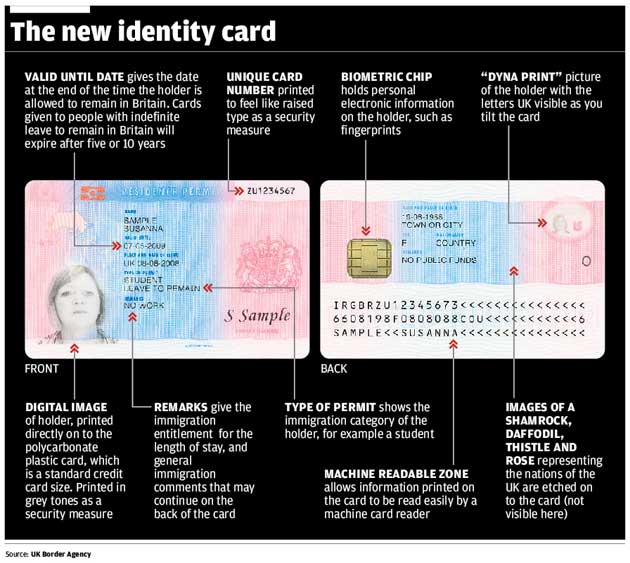First sight of the ID cards that will soon be compulsory

Your support helps us to tell the story
From reproductive rights to climate change to Big Tech, The Independent is on the ground when the story is developing. Whether it's investigating the financials of Elon Musk's pro-Trump PAC or producing our latest documentary, 'The A Word', which shines a light on the American women fighting for reproductive rights, we know how important it is to parse out the facts from the messaging.
At such a critical moment in US history, we need reporters on the ground. Your donation allows us to keep sending journalists to speak to both sides of the story.
The Independent is trusted by Americans across the entire political spectrum. And unlike many other quality news outlets, we choose not to lock Americans out of our reporting and analysis with paywalls. We believe quality journalism should be available to everyone, paid for by those who can afford it.
Your support makes all the difference.The Government was accused yesterday of cynically targeting immigrants to boost support for its controversial £4.7bn compulsory identity cards scheme as the Home Office unveiled the documents it plans will eventually be held by every adult in Britain.
A coalition of opposition parties, trade unions and civil liberties campaigners condemned the symbolic release of the pink and blue cards, which will be introduced for foreign nationals living in Britain from next month. The plastic permits, containing the personal details, fingerprints and immigration status of foreign nationals, offer the first glimpse of what ID cards for British citizens will look like.
Critics attacked the project as a dangerous waste of money that would undermine hundreds of years of civil rights and warned that targeting foreign residents could lead to discrimination and abuse.
Jacqui Smith, the Home Secretary, said the scheme would protect against identity fraud, illegal working and cut organised crime and terrorism.
Dominic Grieve, the shadow home secretary, described the system as "an expensive white elephant", while the Liberal Democrat home affairs spokesman, Chris Huhne, branded ita "plastic poll tax".
Shami Chakrabarti, director of the pressure group Liberty, predicted that the scheme would lead to court action if people from ethnic minorities were targeted: "As a daughter of migrants to this country I think it's a pretty nasty piece of politics to pick on foreign nationals first. It's a divide-and-rule approach when they cannot sell the idea of compulsory ID cards for everybody."
Phil Booth, director of the campaign group No2ID, added: "The Government are picking on soft targets."
Last month the TUC agreed to "resist this scheme with all means at its disposal", while the TUC deputy general secretary, Frances O'Grady, warned in a leaked letter to Ms Smith, that its introduction in the airline industry next year "could be highly counter-productive".
Up to 60,000 cards, containing fingerprints as well as photographs and personal details of the holders, will be issued to people from outside the European Economic Area within the next four months. Students and married people renewing their residence visas will be targeted from 25 November, and Home Office officials expect 90 per cent of foreign nationals to hold a card by 2015.
Ministers said they expected to issue up to one million a year as the system is rolled out across the population over the next three years.
Airport workers and other employees in sensitive roles will be given ID cards from next year before they are offered to young people from 2010 and the general public from 2011. Ms Smith admitted that it would be impossible to include the fingerprints of all citizens on the planned government identity database.
She said that officials were looking at alternatives to the "wholly exceptional" cases of people whose fingerprints could not be scanned into the ID system – in circumstances where their fingertips were worn down; or where they had arthritis or were missing limbs. She insisted: "It is so exceptional that it will not undermine the fundamental nature of the scheme."
Home Office ministers expect to sign the key contracts to deliver the huge national identity database next year. Officials said the contracts would include standard compensation clauses if the project was cancelled, but refused to say how much it would cost to scrap the scheme.
Mr Grieve repeated the Conservatives' vow to ditch the scheme if they win power. He told The Independent: "I hope they have lots of breaks in their contract," adding: "Nearly two years ago, we put government and industry on notice that a Conservative government would abandon the scheme and that the Government should design the contracts appropriately.
"If they have not acted on this to protect the British taxpayer, it is reckless in the extreme at a time of heightened economic uncertainty."
Mr Huhne said: "The Government has gone wobbly-kneed about rolling this out to anyone with a vote. This is the thin end of the wedge. It does not matter how fancy the design of ID cards is, they remain a grotesque intrusion on the liberty of the British people.
"The Government is using vulnerable members of our society, like foreign nationals who do not have the vote, as guinea pigs for a deeply unpopular and unworkable policy."
Join our commenting forum
Join thought-provoking conversations, follow other Independent readers and see their replies
Comments